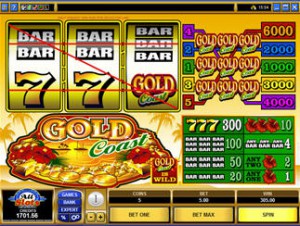To Thine Own Self Be True by Slot Players
Keeping track of your play teaches you about yourself in Slots
By Frank Scoblete
Too many slot players play with wild abandon – and that can be as dangerous to them as Polonius’ not heeding his own advice. It can lead to bankroll death.
In Shakespeare’s masterful play Hamlet, Polonius tells his son Laertes, “This above all to thine own self be true.” That does not mean, as some readers think, “Do what you want because you want to.” Instead it means to be honest with yourself; don’t fool yourself.
If one is honest with oneself, he or she will be honest with others. This is excellent advice. Sadly, Polonius didn’t heed his own advice, and it ultimately caused his death.
Still, many slot players should heed the advice of Polonius because these players play their favorite game, but have no real idea of what they have won or lost over the years. They have no idea of how they actually played.
They kid themselves. They fool themselves into thinking it isn’t as bad as it really is. Such slot players will laugh, “Well, I had a big win but I gave it all back.” They won’t say, of course, that not only did they give their win back, but they lost the rest of their session stake, too. They are not being true to themselves.
You might know some table game players who keep charts of their wins and losses. I certainly know plenty who do so. But I’ve rarely met a slot player who concerns himself with such things. It seems to me that too many slot players play with wild abandon – and that can be as dangerous to them as Polonius’ not heeding his own advice. It can lead to bankroll death.
So let me give you my strongest advice on how to be the best slot player you can be when not playing the machines. You must keep records of all your sessions on a spreadsheet. And you must keep them honestly. You must be true to “thine own self” and write down the bitter and sweet truth.
First get a spreadsheet. This can be a computer program or just the old-fashioned pen and ink kind. Now, across the top make the following list.
- Note the name of the casino where you played
- Note which machines you played
- Note the denomination of the machines you played
- Note how much you gave yourself for a session stake
- Note how many coins you played per decision
- Note how many decisions you played per minute
- Note how much you won or
- Note how much you lost
You might also want to include the comps you received for your play. Sometimes, generous comps can help in keeping your losses in some kind of perspective. Free rooms, free or discounted meals, shows, parties and products have a definite monetary value. Some table game players count the comps as part of their “wins,” and slot players can do this as well.
One thing you should also do is ascertain just how many decisions you are playing in an hour, by multiplying your per-minute decisions by 60. The more decisions you play, the greater the chance you will lose over time. You might find that if you reduce the number of decisions in half, you’ll still have fun but the hit on your bankroll will be far less – yes, probably one half less!
Once you have a year or two of your play on your spreadsheets, you will have a good idea of how much your slot-playing pastime is costing you. You can adjust your play based on this information.
A spreadsheet is a wonderful way to look in the mirror of your play and see its real face.
The next step is to create what I call a 401G money-market checking account with money only used for gambling. (By the way, the “G” in the 401G stands for gambling.)
Having a 401G does several good things:
- It allows you to play with money not used for anything else
- It stops you from digging into the family account for gambling funds
- It keeps slot play in proper perspective as an entertainment feature of your life, not a necessary feature
Finally, you might consider getting lines of credit at the various casinos where you play, but each line should only be a small percentage of your 401G. Let’s say that if you have $10,000 in your 401G, you’ve take out $2,000 lines of credit at three different casinos.
If and when you have exhausted your credit at one casino, you must stop playing at that casino. That’s a built-in safeguard.
How do you create a 401G? If you’re an employee, take a small amount of money from each paycheck and place it into your account. You will see that over even a short period of time such money will add up. If you own your own business, do the exact same thing, a small investment from your monthly profits.
If you’re rich, just take a chunk of your wealth and put it aside for your slot play.
I know it’s not terribly exciting to think about such mundane aspects of your exciting slot play, but to be the best player you can be, you need to actually know what it is you are doing. In short, “to thine own self be true.”
Frank Scoblete’s newest books are Slots Conquest: How to Beat the Slot Machines featuring advantage-play slots; and Casino Craps: Shoot to Win, which comes with DVD showing unedited controlled throws. Cutting Edge Craps: Advanced Strategies for Serious Players and Beat Blackjack Now are all available from Amazon.com, or at your favorite bookstore, or by mail-order by calling 1-800-944-0406. For a free brochure, call the above number.
To Thine Own Self Be True by Slot Players .



